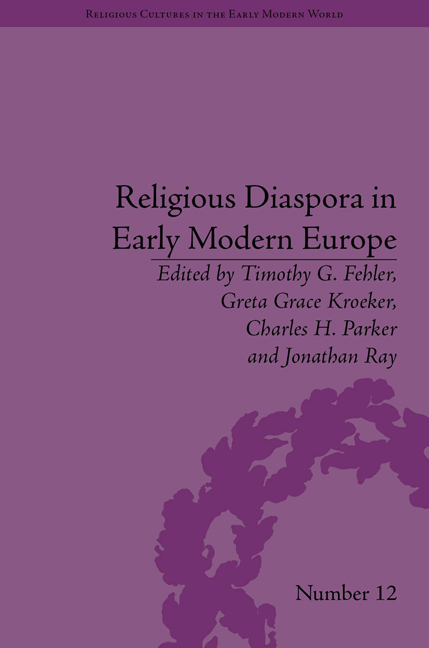Book contents
- Frontmatter
- CONTENTS
- Acknowledgements
- List of Contributors
- List of Figures
- Introduction
- Part I Tactics for Inclusion
- Part II Programmes of Restoration
- Part III Methods of Coping
- 8 Freedom as Exile: Michael Servetus and the Alumbrados
- 9 Coping with Poverty: Dutch Reformed Exiles in Emden, Germany
- 10 Anabaptist Migration to Moravia and the Hutterite Brethren
- 11 Chaos and Community: 1492 and the Formation of the Sephardic Diaspora
- 12 Displaced Intellectuals and Rebuilt Networks: The Protestant Exiles from the Lands of the Bohemian Crown
- Notes
- Index
8 - Freedom as Exile: Michael Servetus and the Alumbrados
from Part III - Methods of Coping
- Frontmatter
- CONTENTS
- Acknowledgements
- List of Contributors
- List of Figures
- Introduction
- Part I Tactics for Inclusion
- Part II Programmes of Restoration
- Part III Methods of Coping
- 8 Freedom as Exile: Michael Servetus and the Alumbrados
- 9 Coping with Poverty: Dutch Reformed Exiles in Emden, Germany
- 10 Anabaptist Migration to Moravia and the Hutterite Brethren
- 11 Chaos and Community: 1492 and the Formation of the Sephardic Diaspora
- 12 Displaced Intellectuals and Rebuilt Networks: The Protestant Exiles from the Lands of the Bohemian Crown
- Notes
- Index
Summary
To illuminate a man is to set him on the path of truth, else will he walk in blindness.
Sebastián de Covarrubias (1611)Light is the greatest beauty in this world, and the next.
Michael Servetus (1553)In sixteenth-century Spain, the symbolism of light, so closely associated with the concepts of knowledge and spiritual elevation, was embodied in an ambiguous collection of heretical concepts, though not a heresy strictly speaking. Known as alumbradismo, or illuminism, it was condemned and persecuted despite the fact that the ideology espoused by its alleged followers was never rigorously defined. Central to the alumbrados' religious sensibility, however, was the cultivation of interiority, and this was shared by the famously heterodox theologian and physician Miguel Servet, known in English as Michael Servetus, himself a radical spiritualist of Jewish converso origins who spent much of his life in self-imposed exile.
The concept of exile works here on several levels. Catholicism's official policies and orthodox teachings effectively created frontiers for right belief and appropriate expression to protect Christians and society from the dangers of stubborn individualism. Transgressing those borders meant crossing over into heresy, which from the Church's perspective meant going into exile. Yet while heresy was a type of exile for the Church, for practitioners of a more interior religiosity it was a haven from the Church's stifling formality and external restrictions.
- Type
- Chapter
- Information
- Religious Diaspora in Early Modern EuropeStrategies of Exile, pp. 107 - 120Publisher: Pickering & ChattoFirst published in: 2014

